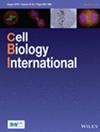The role of soluble epoxide hydrolase in the intestine
IF 3.3
3区 生物学
Q3 CELL BIOLOGY
引用次数: 0
Abstract
The soluble epoxide hydrolase (sEH; encoded by the EPHX2 gene) is an α/β hydrolase fold protein that is, widely distributed throughout the body. Recent studies have highlighted that sEH, in the metabolism of polyunsaturated fatty acids, plays a part in the pathogenesis of various diseases, including cardiovascular disease, Alzheimer's disease and intestine-associated disease. This review discusses the current findings on the role of sEH in the development of intestine- and intestine-associated diseases, including colitis, colorectal cancer, and other intestinal diseases, as well as the potential underlying mechanisms involved.
可溶性环氧化物水解酶在肠道中的作用。
可溶性环氧化物水解酶(sEH;由 EPHX2 基因编码)是一种α/β水解酶折叠蛋白,广泛分布于人体各处。最近的研究表明,sEH 在多不饱和脂肪酸的代谢过程中参与了多种疾病的发病机制,包括心血管疾病、阿尔茨海默病和肠道相关疾病。本综述将讨论目前关于 sEH 在肠道疾病和肠道相关疾病(包括结肠炎、结肠直肠癌和其他肠道疾病)发病过程中的作用的研究结果,以及潜在的内在机制。
本文章由计算机程序翻译,如有差异,请以英文原文为准。
求助全文
约1分钟内获得全文
求助全文
来源期刊

Cell Biology International
生物-细胞生物学
CiteScore
7.60
自引率
0.00%
发文量
208
审稿时长
1 months
期刊介绍:
Each month, the journal publishes easy-to-assimilate, up-to-the minute reports of experimental findings by researchers using a wide range of the latest techniques. Promoting the aims of cell biologists worldwide, papers reporting on structure and function - especially where they relate to the physiology of the whole cell - are strongly encouraged. Molecular biology is welcome, as long as articles report findings that are seen in the wider context of cell biology. In covering all areas of the cell, the journal is both appealing and accessible to a broad audience. Authors whose papers do not appeal to cell biologists in general because their topic is too specialized (e.g. infectious microbes, protozoology) are recommended to send them to more relevant journals. Papers reporting whole animal studies or work more suited to a medical journal, e.g. histopathological studies or clinical immunology, are unlikely to be accepted, unless they are fully focused on some important cellular aspect.
These last remarks extend particularly to papers on cancer. Unless firmly based on some deeper cellular or molecular biological principle, papers that are highly specialized in this field, with limited appeal to cell biologists at large, should be directed towards journals devoted to cancer, there being very many from which to choose.
 求助内容:
求助内容: 应助结果提醒方式:
应助结果提醒方式:


